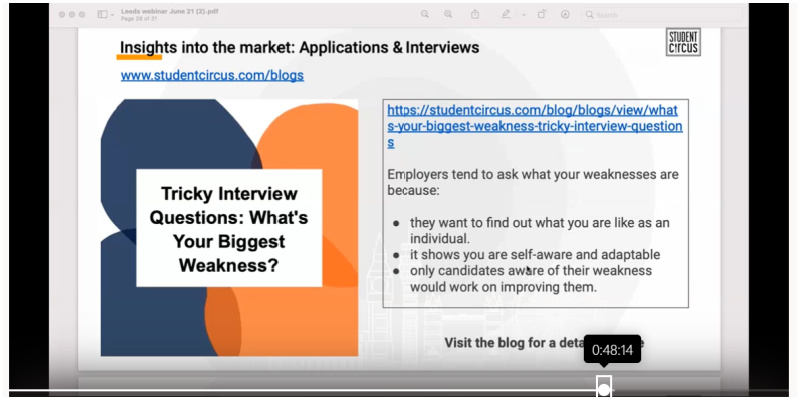Student Circus- Finding and applying for jobs in the UK
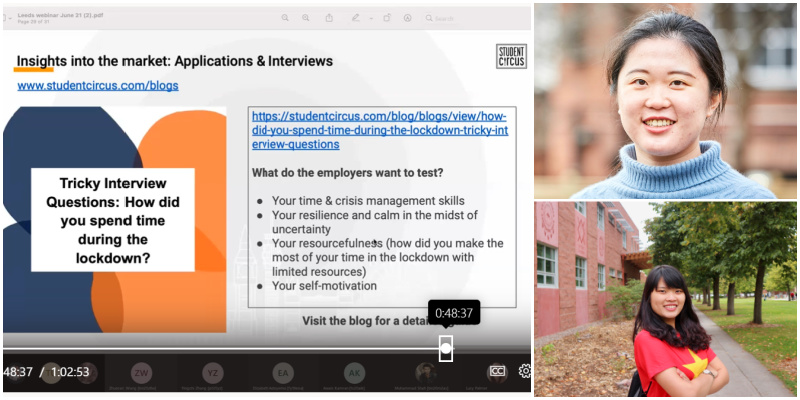
Hello everyone, we are Khanh & Tracy. Last week, we participated together in an event within Graduate Visa Week, which is called “Student Circus- Finding and applying for jobs in the UK”. Now, we will share with you some of the interesting information that we have gained from the event.
The event is hosted by Mr. Dhru Krishnaraj, who is the co-founder of Student Circus- an online platform of job search for international students in the UK. Some advice that I gained from the event is that international students need to be proactive in looking for jobs in the UK. The UK Graduate Market is becoming more and more competitive and as international students, we have limited time on our Student Visa, so the sooner we apply for jobs, the better it is for us.
- Timeline for graduate opportunities:
The UK companies follow a strict timeline to hire graduates. The last quarter of a calendar year (August, September, October, November, December) is the most popular time where most companies open their application, so as international students, we should prepare our CVs, all kinds of documents/paper and start to apply within this timeline.
2. Student Circus- a niche online platform of job search for international students:
Student Circus was founded by 2 graduates who graduated from the UK as international students, that’s why the platform provides different kinds of services that are tailored to support international students including Immigration Assistance, Student Circus Blog and even Job Search in more than 20 countries worldwide.
All students from University of Leeds can now register an account on Student Circus and explore many interesting and helpful services that the website provides to gain more understanding about visa schemes, application, and finding jobs not only in the UK but also in our home countries.
You can register an account on Student Circus by following these 3 simple steps:
- Go to www.leeds.studentcircus.com
- Sign up using your university email ID.
- Verify your email.
I have registered an account on Student Circus as a student from University of Leeds. I have to say the platform is very useful and worth-trying.
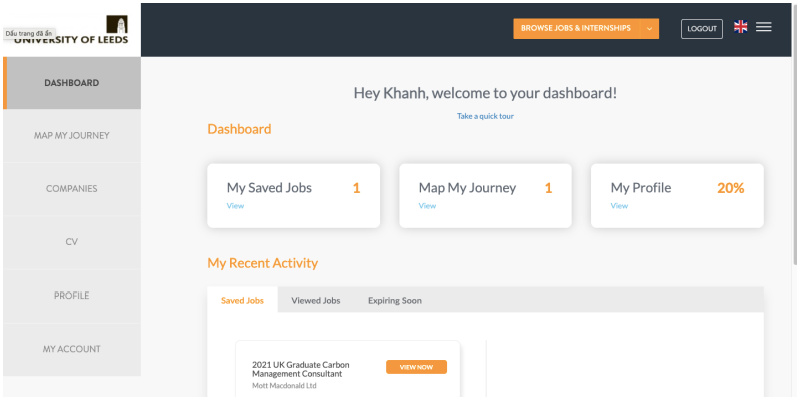
Moreover, there are three key features of the platform: handpicked jobs at elite workplaces for an impact-driven career, immigration assistance in selected countries to assist students in critical visa-related queries in partnership with legal firms, and exclusive career advice and country guides to help students navigate the recruitment style in more than 29 countries.
Besides offering jobs in the UK, Student Circus also helps international students find jobs back home. Currently, they offer jobs in 29 countries globally. Therefore, no matter where you want to work after graduate, Student Circus can be helpful.
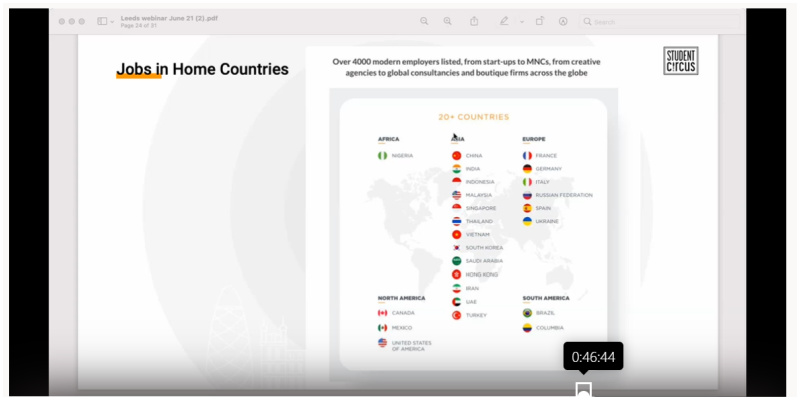
- UK Graduate Market
Since the number of the international students enrolled in HE institutes has been steadily increasing in recent years, the competition for jobs has been increasingly fierce as well. Therefore, when international students look for jobs in the UK, try to apply for it as soon as possible, because the later you do it, the more competition you will face. Thanks to the post-study work visa, international students can stay in the UK for a certain period of time to look for jobs, but international students still need to be aware that that period of time is limited. If you want to stay in the UK longer than that period, you need to find a job in a company that has a sponsorship license and moreover will sponsor your visa. However, not all companies have the sponsorship license and even fewer number of them that actually accept and sponsor international students. Therefore, international students should be very proactive in the job search.
Because of the impact of the pandemic, the economy of the UK has been taking a deep dive and some sectors have suffered a blow. For this year, the six top sectors hiring in the UK are E-commerce, finance, digital marketing, healthcare, real estate and construction and information technology.
When you find a job you want to apply for, the first thing is to make sure that you have a great CV, a cover letter and all the other documents that the company requires. Additionally, some companies require students to answer a couple of questions. Next step for the application is to complete the psychometric tests. There are different psychometric tests depending on what role you are applying for. As the tests are difficult and they are designed to make sure only the best candidates can pass, practicing it as much as possible. The next stage is assessment centre stage, which is conducted in person in most cases. (However, because of the pandemic, it has been moved online). This give candidates an opportunity to get together for one to two days. During this period, you can interact with the company officials, see the infrastructure the company has, and finish the multiple tasks that the company requires you to do as the officials want to observe how you behave in this environment.
And finally, you will come to the interview stage if you pass all the previous ones. For international students, besides finally deciding whether they want to hire you or not, the company needs to make sure that you are legally allowed to start work when required. Make good use of the careers centre of your institution during your application process, because they can help you with your CV, your cover letter, the psychometric tests and they also run a lot of mock interviews.
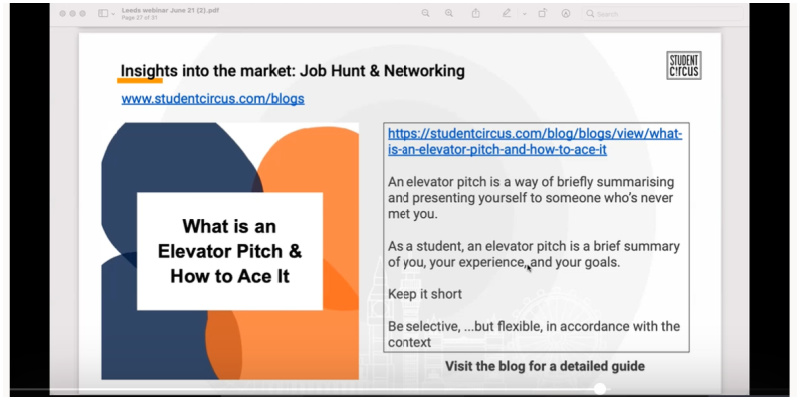
The presenter also gave some advice to the international students. Firstly, the job application is not only about what you are studying at degree level, it is also about how you can show the company that you will perform well in a particular role in a particular sector in that company. Therefore, you need to broaden your scope and apply for different roles, and to make sure that you are not constricted by exactly what you are studying. Also, it is important to balance your applications out, not only applying for the larger companies but also trying the smaller ones. This will give you the better chance to find the right job. It is also important to get some sort of work experience in the UK, such as an internship, a part-time job, a voluntary job. Finally, additional certificates and language skills are also important for job application.
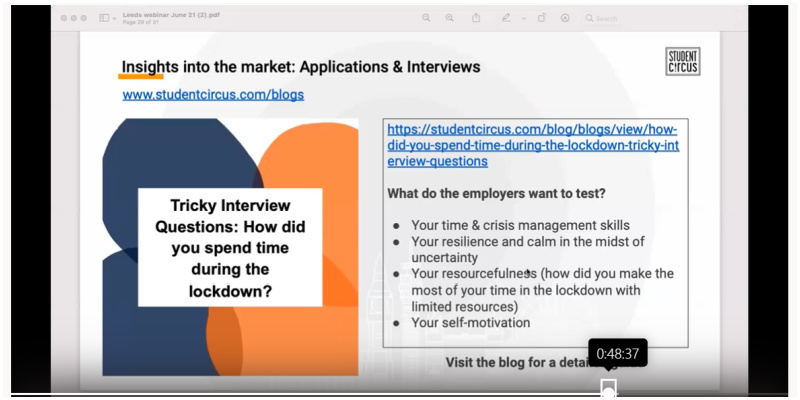
At the end of the presentation, the presenter also shared some blogs on their website. The content of the blogs is closely relevant to job applications, including how to use a good way to summarise and present yourself to the employer who never met you before, how to answer some tricky questions such as what is your biggest weakness and how did you spend time during the lockdown, and so on.
